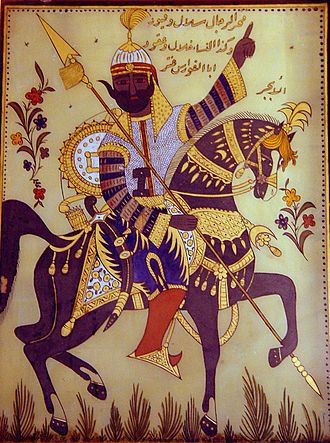
“a pre-Islamic Arab knight and poet, famous for both his poetry and his adventurous life. His chief poem forms part of the Mu’allaqāt, the collection of seven “hanging odes” legendarily said to have been suspended in the Kaaba. The account of his life forms the basis of a long and extravagant romance.”
Comment: When my wife and I were in language school at Monterey for Arabic long ago, the Palestinian “home room” teacher decided to name us for this couple. We were long known in the Arab World by these names. pl

Almost became a ‘Monterey Mary’ for Russian. 52-week school. Took 98J MOS instead.
Interesting History…Pat
“Defend Your Tribe, O Antar..and You Are Free”… think you were well named..
JT
“Defend Your Tribe, O Antar..and You Are Free”
That is quite an exhortation. Maybe it should be brought forward to today in the modern West or at least to the USA. We may have need of it.
Colonel
Have you read Alasdair MacIntyre’s After Virtue (AV)? Your post on Antar has prompted me to ask this question because I am currently working my way through this jaw-dropping masterpiece.
I recall a comment on your blog some years ago expressing incredulity that you were identified with a pre-Islamic (black) warrior poet from the 6th century. The absence of the conceptual framework for understanding how a modern, Western man may share the qualities of a figure from a long past heroic age is very much the subject matter of AV. Alastair Crooke has cited the book more than once in his writings, which is part of what led me to it.
MacIntyre’s central thesis is that though it disguises the fact, what passes for moral philosophical analysis today everywhere implicitly accepts the tenets of emotivism. He asserts that this is because we have largely lost the concepts of objective virtue, honor and of telos essential to the Aristotelian ethical framework, and he identifies Nietzsche as having recognized this in the most explicit fashion. Simultaneously he demolishes Nietzsche’s idealization of the Übermensch in a couple of sentences: “What Nietzsche portrays is aristocratic self-assertion; what Homer and the sagas show are forms of assertion proper to and required by a certain role.. ..Hence when Nietzsche projects back onto the archaic past his own nineteenth-century individualism, he reveals that what looked like an historical inquiry was actually an inventive literary construction” (towards the end of the chapter; The Virtues in Heroic Societies).
The book is not a scholarly work though it is dense and extremely well sourced. MacIntyre opens with an allusion to A Canticle for Leibowitz as an allegory of what the study of ethics has become. MacIntyre himself is 93 and still apparently active in the de Nicola Center for Ethics and Culture at University of Notre Dame, IN. I wondered if you might know him, through the Catholic intellectual grapevine or otherwise.
BA
Not “incredulity, just humor.
I loved The Life and Deeds of Antara epic, translated into Russian when I was a kid
https://www.goodreads.com/book/show/40202889